March 8 is International Women’s Day, a global day to celebrate the achievements of women everywhere, raise awareness about continued discrimination based on gender, and take action to promote gender parity. The Galapagos Initiative is home to incredible female leaders and scientists at UNC, USFQ, the Galapagos Science Center (GSC), and collaborators through our International Galapagos Science Consortium. Since the GSC was founded in 2011, over 50 women have led research across more than 74 research projects. International Women’s Day is a great opportunity to highlight some of these talented women in our global community!
Gina Chowa, Associate Dean for Global Engagement, UNC School of Social Work
Through the UNC School of Social Work, Gina Chowa conducts research about the needs of community members in Galapagos to develop a human-centered approach to addressing those needs. She and her team have piloted two projects focused on the risk and protective factors related to youth pregnancy and violence, including a collaborative social work certification program with USFQ.
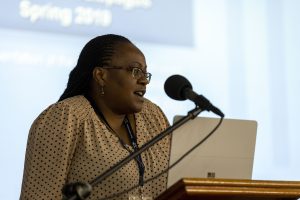
“Our research takes on a human centered design to address the needs of the people in the Galapagos,” Gina said. “This is what social work is all about – human centered approaches that provide tools to the people to solve their own problems.”
Through the field of social work, Gina invests a lot of time in community, both the ones she works with, such as in the Galapagos, and those back home. In reflecting about the important women who have touched her life, Gina turned to her most personal community: her mother and grandmother.
“Although they are both late now, they demonstrated strength in the face of adversity,” she said. “They grew up in a society where women were not given a chance to thrive, but they both beat the odds and became role models to many women in their communities.”
To Gina, International Women’s Day is simultaneously a reminder of the many achievements and progress women have made and of the fact that “we still need to harness the strength and determination of women to address the issues of gender equality, violence, and abuse against women.”
“The ten values that guide International Women’s Day are values that I leverage every day in my work: justice, dignity, hope, equality, collaboration, tenacity, appreciation, respect, empathy, and forgiveness,” Gina said.
Stella De La Torre, Professor of Biology, USFQ; Chair, GSC Advisory Board
Through her position at USFQ, Stella De La Torre researches the feeding ecology of both native and introduced land snails in the highlands of San Cristobal Island. Galapagos land snails, one of the species she studies, are both a highly diverse and an endangered group of animals in the archipelago, so her research aims to inform conservation methods for these endemic creatures.
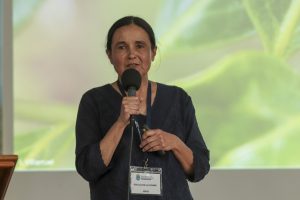
Stella is also the chair of the GSC Advisory Board, a group of researchers from both USFQ and UNC, that advises the jointly operated GSC.
“It is a privilege for me to be part of the board,” Stella said. “Having the opportunity to share ideas with such a committed group of outstanding scientists, as my colleagues on the board, is invaluable.”
Stella sees International Women’s Day as “a call to continue working for a world of respect, inclusion, and equal opportunities for all.”
She also offers this advice to young women in the sciences: “Be perseverant and confident, but humble. Take time to listen to the experience and advice of others, but be skeptical. Always use your critical and ethical thinking to test both new ideas and established knowledge.”
Cristina Vintimilla, Laboratories Manager & Marine Ecology Lab Coordinator, GSC
Through both her positions at the GSC, Cristina Vintimilla oversees the operation of the GSC labs and preparation for researchers coming to use the facilities. She also contributes to fieldwork on a variety of research projects and works with the science education programs that are a big part of the GSC community outreach program, Connecting with Nature. This program has been reaching communities across San Cristobal, Isabela, and Santa Cruz islands as well as mainland Ecuador since 2019 through activities such as reading sessions with “Marti the hammerhead shark,” which encourages children to learn about conservation while practicing reading skills.
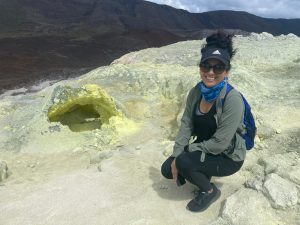
“It warms my heart to play a part in sparking curiosity and enthusiasm in the minds of these budding scientists,” Cristina said.
Her own curiosity about the offerings of the Galapagos is what brought Cristina to the Galapagos in search of furthering her conservation efforts.
“During my academic pursuits, I frequented the Galapagos Islands and developed a profound affection for the region’s biodiversity,” she said. “However, with each visit, I observed noticeable changes—increased hotels, a surge in tourism, and restaurants offering species that lack proper regulation or understanding of their life cycles.”
In 2017, Cristina wrote her master’s thesis on the reproductive cycle of chitons, a type of mollusks, in order to contribute to their conservation. She conducted all of her laboratory research for this paper at the GSC. This work “heightened my interest in being part of the staff and contributing to protecting this lovely place that I have the privilege to call home.”
Working in the Galapagos has also shown Cristina the value of researchers engaging with the local community.
“I firmly hold the conviction that the most effective way to preserve a place or a species is by actively engaging with the local community,” Cristina said. “We scientists can contribute valuable information, but the community has intricate knowledge [about the islands].”
To other young women in the sciences, Cristina urges, “Never give up following your dreams! Cultivate self-confidence, as it will empower you to overcome obstacles and make meaningful contributions…Science is a fascinating world; staying curious will keep you motivated, inspired, and open to new ideas and discoveries.”
Salomé Jaramillo Gil, PhD student, UNC
Salomé Jaramillo Gil, who is also a Fulbright scholar, is pursuing a PhD in biology and studying hammerhead sharks and eagle rays in the Galapagos. In particular, Salomé studies the migration and behavior of these animals and the way that their migration patterns relate to oceanographic features, with the ultimate goal of being able to predict these movements in order to further conservation efforts of the species.
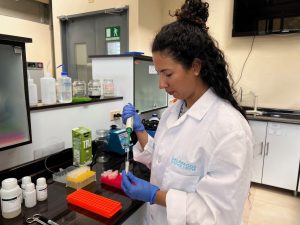
In addition to her invaluable experience working with the sharks and rays, Salomé stresses the value of the collaboration possible through UNC’s commitment to partnership, including with USFQ through the GSC. “Collaborating with an interdisciplinary team of scientists from Ecuador, Colombia, and the USA, whose expertise ranged from ecology and modeling to fisheries and genetics, allowed us to develop a more comprehensive work,” she said.
Both within and outside of the sciences, there are a lot of women that Salomé has looked up to throughout her career. An early hero was Sylvia Earle, a “visionary marine biologist” dedicated to conservation. More recently, Salomé has been inspired by Diana Trujillo and Katya Echazarreta, two Latina “trailblazers” at NASA, and Tatiana Calderón, a Formula One racer who “shattered barriers” in the sport.
Regarding International Women’s Day, Salomé says, “I recognize the significance of International Women’s Day for honoring extraordinary women’s achievements. However, I celebrate women’s achievements and advocate for gender equality every day, actively supporting and applauding their success, especially in traditionally male-dominated fields.”
Salomé looks to a future of greater equality for women everywhere: “True progress lies in making respect and equality the norm, not just an annual event. Let’s create a society where respect and equality for all genders are the norm, not just an aspiration.”
Alice Skehel – PhD student, University of the Sunshine Coast
Alice Skehel studies at the University of the Sunshine Coast in Australia, one of the schools in the International Galapagos Science Consortium, which also includes James Cook University in Australia and North Carolina State University in the U.S. The Consortium is designed to offer a global scientific network of institutions and scholars, including scientists like Alice, to generate innovative study of island ecosystems.
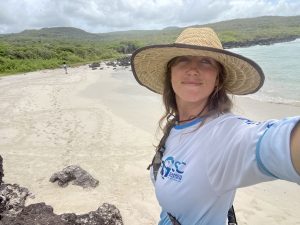
As a member of the Consortium, Alice is connected to the facilities and researchers at the GSC in her own work, through which she studies how human influences impact some of the rarest oceanic birds in the Galapagos Islands, such as flightless cormorants.
Alice found the GSC in 2016 when she started volunteering as an undergraduate. From there, she connected with researchers who invited her to join their work. This ultimately led to the invitation to join the University of the Sunshine Coast, who expressed that they were looking to support more students and projects in the Galapagos.
“I am now the Principal Investigator of my own project collaborating with other amazing researchers in the islands,” Alice said.
A huge part of Alice’s success working with the GSC has been the women who work there with her.
“I am beyond proud to work with the many Ecuadorian women at the Galapagos Science Center that are running their own research projects, managing the laboratories, logistics and equipment, coordinating often difficult partnerships with multiple organizations or the administration that is an essential part of working in the Islands. Without these women my work would not be possible!”
Alice also offers her own perspective on International Women’s Day: “A ‘Women’s Day’ may feel unnecessary to those who are unaware of the issues that still persist with harassment, unequal pay and opportunities, discrimination, and inequalities at home. International Women’s Day is a chance to celebrate all the women that take this on and still bring positivity to their work and life and to all the other people that empower women.”
The work at the CGS, GSC, and global Galapagos research community would not be possible without the work of the many women who conduct research, build community, manage research facilities, and contribute in other ways to advance research, education, conservation, and community building in and around these islands.
By Andy Little ‘24
